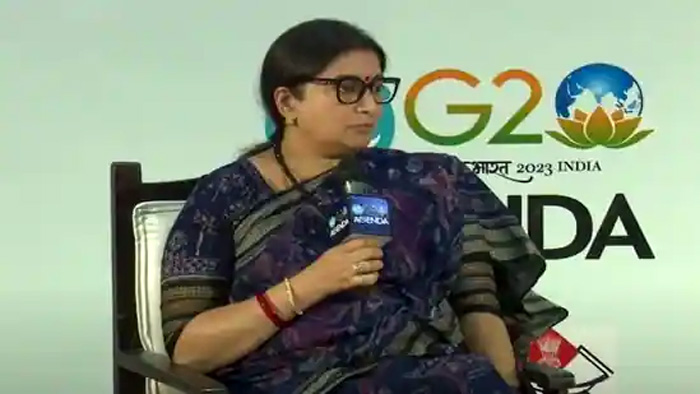‘Language of tech, AI’: Smriti Irani on barriers to women on digital divide
Union Minister Smriti Irani on Monday said that there are three main barriers for women to bridge the digital divide – the language of technology, affordability, and the disruption that AI may cause.
Addressing the topic of ‘women-led development’ – a key agenda item at the G20 Summit – during an event organized by Hindustan Times, the union minister said that there needs to be “new segments of engagement in the economy which can bring more value to women’s capacity to productively contribute to her economy.”
“We are a country of 16,000 dialects, 125 constitutionally recognised languages. How much technology is available in those languages?” she questioned.
“…So while the govt has pronounced the PLI scheme to ensure mobile phones are manufactured in our country – that part of the challenge is being addressed. The larger challenge is, how many women are participating in the divide now because of a lack of access to technology in the language that they understand,” the union minister said.
Citing some examples of technology language that most women know currently, Irani said, “Let’s say, the language is money, during the lockdown, PM digitally transferred 30,000 crores to the banks of 220 million women. It was digitally done, so they know the language of money. If you look at not only the loan structure, but also the self-help group structure… today on GeM which is a govt platform, the PM has mandated that if PSUs have to be purchased, they need to ensure 3% of their purchase is from women-led enterprise. There is now an affirmative action in procurement from women-led businesses. Again, that is a language of money that they’re understanding.”
She added, “What is the other language in which technology has to be available? – That falls under the realm of education themselves. Many women in our country today, and I will unabashedly say that I’m a part of it, gave up their education because either they have to look upto to their families or they had a career that made them move and they could not afford to educate themselves to the level of satisfaction that they personally wanted to do so.”
According to the minister, she wants to scale up this issue under the care economy. “If you look at the care economy today, you can create 300 million jobs and they will predominantly come to women. So if I have to scale up, I will want to do it in that segment,” she said.

